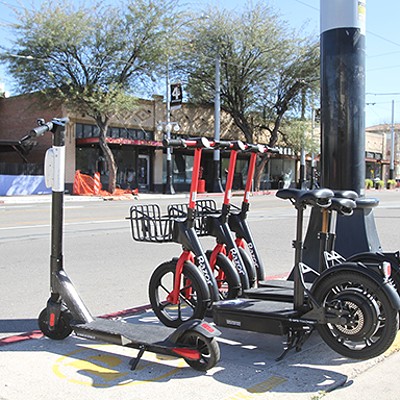Take navigation. Many animals have a natural ability far superior to our puny skills at finding our way around: birds, butterflies, dolphins and whales, to name just a few. Even domesticated dogs and cats have been known to find their way home from hundreds of miles away through unknown territory.
Humans, on the other hand, need to rely on all sorts of gadgets in order to make their way to the nearest Starbucks. (Though a dwindling minority, there are still a few Luddites who know how to get around using nothing more than the stars, the sun and instinct. Most of us need at least a map.)
On a recent cross-country trip, my husband and I were lent a state-of-the-art global-positioning system. For years, we've been making our way across countries and continents with nothing more than maps, memories and our occasionally conflicting senses of direction. On more than one occasion, we both--either together or individually--arrived at a destination with no map at all.
But with a gadget to guide us, this trip would be different. And, except for feeling like we'd stepped out of an episode of Lost in Space when our GPS system showed us traveling across an expanse of nothing leading nowhere, it worked, for the most part. (Which is more than can be said for the Pennsylvania couple whose reliance on a GPS device landed them stranded in the Utah desert for several days recently before they were rescued.)
As we played with our borrowed toy, we realized today's crop of new drivers--technologically suckled teenagers--largely lack any navigational skills more challenging than pushing some buttons or issuing a voice command. Unless these youngsters once joined a scouting troop or were raised by survivalist hunters, they have not the slightest ability to find their way around. Talk about the lost generation: For these kids, it's more than a metaphor.
The loss of our navigational skills is just one manifestation of our eagerness to embrace technology without giving any thought to the consequences. Quick: Add 19, 27, 92, 78 and 69. You can even use paper and a pencil (if you can find any). Not so easy, eh? Though adding a column of figures used to be routine, these days, calculators have pretty much wiped out our ability to do simple arithmetic. Does anyone even learn the multiplication table anymore?
We've even turned our memories over to technology. Why bother remembering phone numbers when they are on speed dial or in a contact list?
Cooking is another area where our creativity has been trumped by an electronic circuit board: in this case, a microwave. We could once anticipate hours spent in the kitchen would be amply rewarded by a tasty dinner with complex flavors. Now, we impatiently tap a foot if our prepackaged concoction takes six minutes. Six minutes!
But of all the areas where technology alters our lives, perhaps none is more insidious than that of the electronic book. Call me an unredeemable romantic, but curling up in front of the fire with a Kindle, Amazon's version of the e-book, doesn't hold the same attraction as diving into a newly purchased book, its spine unbroken and its pages wafting the comforting scent of fresh (soy-based, of course) ink.
I know the arguments: Books require the death of trees; e-books are cheaper to produce; e-books are more convenient. But electronic books produce their own environmental nightmare by contributing to the growing mountain of e-waste shipped to countries like China, where the waste contaminates soil and water, and can cause illness among unprotected workers in the process of recycling.
As for being cheaper and more convenient, a stolen Kindle demonstrates how fatuous this argument is. Forget a book on a park bench? No big deal. But forget a Kindle, and, well, it's a much bigger deal.
There is no disputing that technology has its place. I value my laptop and, with the exception of those moments when I'm teetering on the edge of technologically induced meltdown, would not dream of returning to a typewriter--even one that is self-correcting. By and large, computers have made many mundane tasks easier.
But at the same time, our dependence on technological fixes limits our opportunities to meet challenges with creative, out-of-the-box solutions. And by handicapping ourselves with this kind of shortsightedness, we make navigating uncharted territory, if not impossible, far more difficult.





